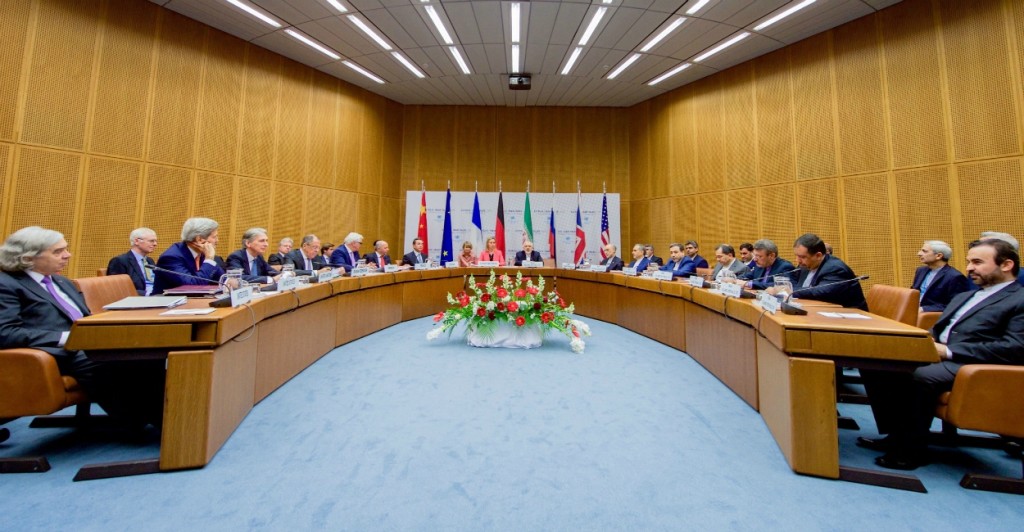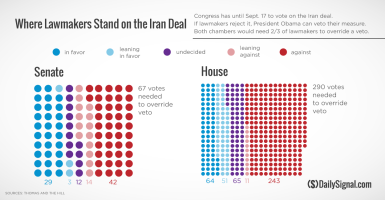Democratic Sen. Patty Murray of Washington announced support for the Iran deal Tuesday, following on the heels of Sen. Debbie Stabenow, D-Mich., to further President Barack Obama’s growing support in the Senate.
The announcements mark a setback to Republican-led efforts to secure the 67 votes needed to override a presidential veto if a resolution of disapproval hits Obama’s desk.
Two top Senate Democrats have vowed to oppose the agreement, but Republican senators need 11 of the 17 Democrats who have yet to announce a position.

Five key Democrats could determine the fate of the nuclear deal between Iran and the P5+1. (Photo: State Department photo/SIPA/Newscom)
Meet five key Democratic senators who are still on the fence.
Benjamin Cardin, Maryland
Sen. Benjamin Cardin, the ranking Democrat on the Foreign Relations Committee, holds perhaps the most critical influence in the fate of the Iran deal. Cardin was thrust into central focus after Sen. Chuck Schumer, in line as the next Democratic leader, publicly announced opposition to the accord.
Cardin’s position as a top Jewish lawmaker, along with his persistent support for Israel during his eight years in the Senate, has made him a primary target for lobbying offensives on both sides of the deal.
He has spoken with Obama and Energy Secretary Ernest Moniz, a nuclear physicist and an architect of the deal, numerous times to address concerns, but he has remained silent and likely will not announce his position until after Labor Day.
“This is such an elevated decision that members have to make,” Cardin told reporters. “You don’t look to someone else as to how you’re going to vote. This is something that you’re going to decide as to what’s in the best interests of our country.”
Cardin has also spoken with Israeli Prime Minister Benjamin Netanyahu, who called the accord a “historic mistake,” and has met with the American Israel Public Affairs Committee, the lead pro-Israel lobbying group that has launched a nonprofit organization to run ads against the deal in Baltimore and nationwide.
He even became the first lawmaker specifically targeted through a Snapchat ad after advocacy group Secure America Now purchased a geofilter promoted in Maryland with the text “Tell Senator Cardin: No to the bad Iran deal!”
Cardin has split from the White House before, voting against Obama’s fast-track trade bill and opposing the president’s legal justification to continue the war against ISIS.
But his voting record reveals a disposition toward diplomacy. During his time in the House, he notably voted against the 2002 authorization for the use of military force to invade Iraq.
Chris Coons, Delaware
Sen. Chris Coons, also a member of the Foreign Relations Committee, is another central figure among the undecided senators. Before he was elected to the Senate in 2010, Coons was an attorney for his family’s company, W.L. Gore & Associates.
His experience in law conditioned him to closely scrutinize complex deals, establishing a habit he indicated has carried over as he carefully reviews the nuclear agreement.
“I will tell you, my gut response at several places has been grave concern,” he told The Washington Post.
Coons has spoken with Obama and Vice President Joe Biden about his apprehensions, telling Politico the administration must assure him the provisions regarding inspections and sanctions “won’t enable Iran’s long-term ability to build a bomb.”
He said he would assess the agreement “with a position of suspicion and distrust of Iran,” given its history of “supporting terrorism globally.”
Coons said the input from his constituents is divided, but he has remained adamant he would put political and partisan inclinations aside to determine his position based on the details of the accord, calling it a “vote of conscience.”
“There are these watershed votes that have a real impact on how we see ourselves as a country, how we are seen in the world, and how we are perceived as an ally,” he told The Christian Science Monitor.
Richard Blumenthal, Connecticut
Sen. Richard Blumenthal, another Jewish Democrat with a staunch record of Israel-support, told constituents in August that the nuclear accord has “weaknesses,” noting that “there may have been a better deal if we’d had different people doing it.”
Blumenthal’s ties to the Jewish community have made him a key focus for both the administration and opponents of the deal working to capture his vote. He was one of four Democratic senators targeted by the American Security Initiative in a $1.4-million ad campaign.
He has also met with the Obama administration and lobbyists from AIPAC to flesh out concerns.
But the junior senator remains tight-lipped on his position, telling Bloomberg he would spend the August recess listening to constituents and would base his vote on what is “right” for the U.S.
“I’ve been digging into documents, speaking to the administration and to opponents,” he told The New York Times. “I’ve raised issues with the administration. I’m awaiting responses, and they could be determinative.”
Ron Wyden, Oregon
Sen. Ron Wyden describes himself as a “diplomacy guy” and, along with Cardin, was one of only 23 senators who voted against the Iraq War in 2002.
But the Jewish senator, whose parents fled from Nazi Germany, is also a top recipient of pro-Israel funding and expressed suspicion of the deal in a July 14 statement released the day the agreement was reached in Vienna.
“I said all along I was skeptical that Iran’s leaders would agree to dismantle their nuclear weapons program and I have questions about whether this agreement accomplishes that, particularly in light of Iran’s history on this issue,” he said.
He told Oregon Public Broadcasting he is “deeply concerned” about the billions of dollars estimated to pour into Tehran if the accord remains intact, calling it a “significant factor” in his decision.
“Iran is going to get a substantial amount of money here … a very real portion of that money will go to support Hamas and Hezbollah,” he said.
The three-term senator faces re-election in 2016 and has already received pushback from Democrats in the state who are angry at him for supporting Obama’s trade deal.
Joe Manchin, West Virginia
Sen. Joe Manchin, the former governor of West Virginia whose red-state constituents tend to push against Obama’s policies, said in July he was leaning toward supporting the accord, but he has yet to announce an official position.
“Everybody says there is a better deal,” he told MSNBC. “What options are on the table or even basically discussed I could consider voting for?”
But he has also criticized the Obama administration for lifting the arms embargo on Iran under the final agreement.
“I want to find out why it came back in. It was not part of the original talks,” Manchin told Politico. “What did we get for that?”
Manchin has also previously backed two rounds of additional sanctions legislation during negotiations, which the White House opposed. He later pulled his support.
“I did not sign it with the intention that it would ever be voted upon or used upon while we’re negotiating,” he told MSNBC.




























